- Clone
- A15114B (See other available formats)
- Regulatory Status
- RUO
- Other Names
- Zeta chain associated protein kinase, SYK related tyrosine kinase, ZAP-70
- Isotype
- Mouse IgG2b, κ
- Ave. Rating
- Submit a Review
- Product Citations
- publications
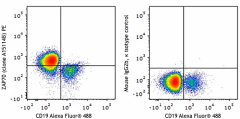
-

Human peripheral blood lymphocytes were surface stained with CD19 Alexa Fluor® 488 then treated with the True-Nuclear™ Transcription Factor Buffer Set (Cat. No. 424401) and intracellularly stained with anti-ZAP70 (clone A15114B) PE (left) or mouse IgG2b, κ PE (right). -

Human peripheral blood lymphocytes were surface stained with CD56 APC then treated with the True-Nuclear™ Transcription Factor Buffer Set (Cat. No. 424401) and intracellularly stained with anti-ZAP70 (clone A15114B) PE (left) or mouse IgG2b, κ PE (right).
| Cat # | Size | Price | Quantity Check Availability | Save | ||
|---|---|---|---|---|---|---|
| 691203 | 25 tests | 98€ | ||||
| 691204 | 100 tests | 230€ | ||||
ZAP70 is a 70 kD protein tyrosine kinase associated with the zeta chain of the T cell receptor. It is expressed in T cells and NK cells and has been shown to be involved in T cell signaling. Defects in ZAP70 have been linked to selective T cell defects. The ZAP70 kinase undergoes multiple phosphorylation events after T cell receptor engagement and interacts with a number of proteins involved in signal transduction. Recently, ZAP70 has been identified as an important prognostic marker in B-cell chronic lymphocytic leukemia (B-CLL).
Product DetailsProduct Details
- Verified Reactivity
- Human, Mouse
- Antibody Type
- Monoclonal
- Host Species
- Mouse
- Immunogen
- KLH-peptide surrounding ZAP70 Y319.
- Formulation
- Phosphate-buffered solution, pH 7.2, containing 0.09% sodium azide and BSA (origin USA)
- Preparation
- The antibody was purified by affinity chromatography and conjugated with PE under optimal conditions.
- Concentration
- Lot-specific (to obtain lot-specific concentration and expiration, please enter the lot number in our Certificate of Analysis online tool.)
- Storage & Handling
- The antibody solution should be stored undiluted between 2°C and 8°C, and protected from prolonged exposure to light. Do not freeze.
- Application
-
ICFC - Quality tested
- Recommended Usage
-
Each lot of this antibody is quality control tested by intracellular flow cytometry using our True-Phos™ Perm Buffer in Cell Suspensions Protocol. For flow cytometric staining, the suggested use of this reagent is 5 µl per million cells in 100 µl staining volume or 5 µl per 100 µl of whole blood.
- Excitation Laser
-
Blue Laser (488 nm)
Green Laser (532 nm)/Yellow-Green Laser (561 nm)
- Product Citations
-
- RRID
-
AB_2721648 (BioLegend Cat. No. 691203)
AB_2721648 (BioLegend Cat. No. 691204)
Antigen Details
- Structure
- Protein tyrosine kinase, contains two SH2 domains. Human Zap70 has three isoforms with predicted MW of 70kD, 56kD, 36kD. Mouse Zap70 has three isoforms with predicted MW of 70kD, 36kD, 35kD.
- Distribution
-
T cells, NK cells.
- Function
- Signal transduction, associates with the T-cell antigen receptor zeta chain tyrosine-based activation motif when phosphorylated. Defects in ZAP70 causes selective T cell defect.
- Interaction
- Signal transduction, associates with the T-cell antigen receptor zeta chain tyrosine-based activation motif when phosphorylated.
- Cell Type
- NK cells, T cells
- Biology Area
- Cell Biology, Immunology, Signal Transduction
- Molecular Family
- Protein Kinases/Phosphatase, TCRs
- Antigen References
-
1. Chan AC, et al. 1992. Cell. 71:649.
2. Chan AC, et al. 1994. Science. 264:1599.
3. Arpaia E, et al. 1994. Cell. 76:947. - Gene ID
- 7535 View all products for this Gene ID
- UniProt
- View information about ZAP70 on UniProt.org
Related FAQs
- What type of PE do you use in your conjugates?
- We use R-PE in our conjugates.
Other Formats
View All ZAP70 Reagents Request Custom Conjugation| Description | Clone | Applications |
|---|---|---|
| Purified anti-ZAP70 | A15114B | WB,ICFC |
| Alexa Fluor® 647 anti-ZAP70 | A15114B | ICFC |
| PE anti-ZAP70 | A15114B | ICFC |
Compare Data Across All Formats
This data display is provided for general comparisons between formats.
Your actual data may vary due to variations in samples, target cells, instruments and their settings, staining conditions, and other factors.
If you need assistance with selecting the best format contact our expert technical support team.
-
Purified anti-ZAP70
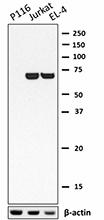
Total cell lysates (15 µg protein) from P116, Jurkat and EL... 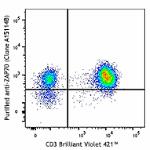
Human peripheral blood lymphocytes were surface stained with... 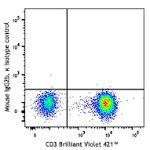
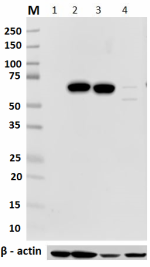
Total cell lysates (15 µg protein) from Ramos (lane 1), Jurk... -
Alexa Fluor® 647 anti-ZAP70
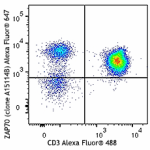
Human peripheral blood lymphocytes were fixed with Fixation ... 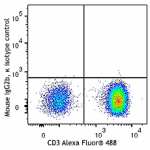
-
PE anti-ZAP70

Human peripheral blood lymphocytes were surface stained with... 
Human peripheral blood lymphocytes were surface stained with...

 Login / Register
Login / Register 












Follow Us